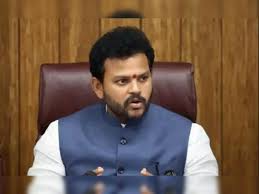Air India crash probe: ‘AAIB totally unbiased…want to stand with truth,’ says Civil Aviation Minister Naidu in Rajya Sabha

Civil Aviation Minister K. Naidu assured the Rajya Sabha that the Air Accident Investigation Bureau (AAIB) is conducting a fair, independent probe into the recent Air India Express crash. Emphasizing transparency and truth, Naidu said the government won’t interfere in the process or shield anyone responsible.
His statement came during a charged Parliament session, where lawmakers pressed the government over aviation safety, regulatory oversight, and accountability. Addressing their concerns, Naidu defended the professionalism of the AAIB and stressed the importance of letting the investigation run its course.
Mounting Concerns Over Aviation Safety
The tragic crash, which resulted in several fatalities, has reignited debate over aviation safety in India. Many lawmakers demanded answers regarding maintenance lapses, pilot fatigue, and potential regulatory failures.
In response, Naidu highlighted that the AAIB functions independently and consists of trained aviation experts. He said, “Their duty is to identify the cause, not to cover up mistakes or jump to conclusions.” Furthermore, he reminded the House that such investigations require time and technical analysis, not emotional judgment.
No Shielding, No Prejudgment, Minister Declares
Naidu firmly stated that the government has no intention of protecting any individual or agency. “If there was negligence—whether in training, maintenance, or operations—it will come out,” he affirmed. Rather than speculating, he encouraged Parliament to allow investigators to do their job with integrity.
Additionally, he urged all parties to avoid politicizing the tragedy. “The families who lost loved ones deserve calm, clarity, and facts—not noise,” he said. His comments were met with nods of agreement from many members.
Commitment to Full Transparency
Naidu also made a significant promise: the final AAIB report will be made public. Unlike in some past cases, this report will include all technical details—flight data, cockpit recordings, ground crew interviews, and more.
Importantly, he emphasized that the government would act swiftly on any recommendations from the report. “We will not wait for headlines to guide us. We will act based on expert findings,” he said, reassuring those concerned about follow-through.
Opposition Stresses Systemic Failures
Despite these assurances, opposition MPs remained critical. Several argued that the issue wasn’t just about one accident but about deeper flaws in the aviation system. “We’ve heard promises before, but the system keeps failing,” said one MP from Kerala, a state deeply affected by the tragedy.
Others pointed to chronic understaffing, weak oversight, and outdated safety norms. In their view, piecemeal reforms won’t solve what they called a structural problem.
Naidu pushed back, saying that ongoing reforms were already in motion. Nevertheless, he admitted that this crash should serve as a “serious reminder” to tighten aviation systems further.
Public Demands for Accountability Grow
Beyond Parliament, the crash has sparked outrage and sorrow across the country. Grieving families continue to demand accountability. Many are asking for a parallel judicial inquiry alongside the AAIB probe.
Moreover, aviation worker unions have raised red flags. They warn that long duty hours and fatigue among flight crews could pose risks. One union leader said pilots often face pressure to meet tight schedules, compromising safety.
A well-known aviation analyst echoed these concerns. “Crashes can happen anywhere, but true safety lies in how seriously a country acts after one,” he told a leading news channel.
Fast-Growing Aviation Needs Better Oversight
India’s aviation market is one of the fastest-growing globally. With expanding air routes, rising passenger numbers, and increasing fleet sizes, ensuring safety becomes even more critical.
Naidu acknowledged this growth. “Yes, we’re modernizing. We’re adding airports and training thousands of professionals. But growth means nothing without safety,” he said.
To that end, the ministry has begun upgrading air traffic systems, expanding pilot training, and enforcing stricter aircraft maintenance schedules. He added that new safety audits are already underway across major airlines.
What Lies Ahead for the Investigation?
The AAIB is in the final stages of completing its detailed investigation. A preliminary report is expected soon. Until then, the Civil Aviation Ministry has taken precautionary steps. Certain aircraft models have been temporarily grounded, and safety checks have been ordered across airlines.
Concluding his remarks, Naidu made a clear promise. “We stand with the truth, the victims, and every citizen who boards a plane in our country. Our commitment is not to silence critics but to fix what needs fixing.”
Conclusion
The Air India crash has triggered deep reflection on aviation safety in India. Minister Naidu’s strong message in Parliament offers some reassurance. However, the true measure will lie in action—how the findings are implemented, how systems improve, and how justice is delivered to the victims and their families.
A transparent, fact-based investigation and bold reforms are not just expected—they are necessary. India’s skies must remain safe not just in policy, but in practice.






